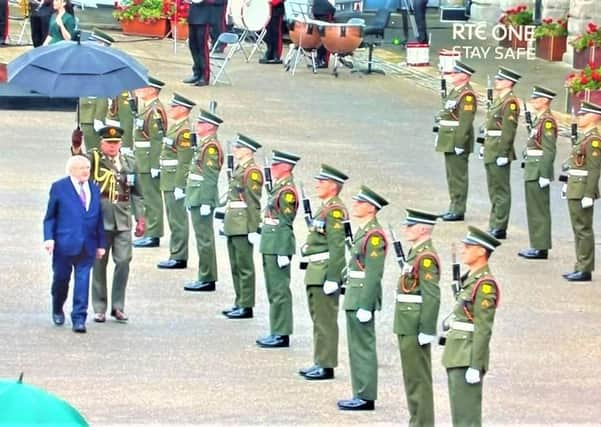Irish president: War wouldn’t have broken out if British didn’t snub voters


Michael D Higgins said that the conflict’s de facto end date of exactly 100 years ago today, when a truce was agreed between Irish and British forces, came after the grief of the 1918 pandemic and the internecine conflict sparked by the creation of Northern Ireland.
The truce ended close to two-and-a-half years of attacks, which are estimated to have left over 2,000 people dead.
Advertisement
Hide AdAdvertisement
Hide AdIt had its roots in the upwelling of public support for independence which had followed the 1916 Rising.
But the independence war itself was followed by the Irish Civil War, which left many hundreds more Irishmen dead as Michael Collins’ pro-peace treaty forces battled those of Eamon De Valera’s anti-treaty IRA.
Mr Higgins’ message was as follows: “The Truce is a significant event in the Decade of Commemorations.
“Reflecting on the Truce, which was agreed 100 years ago, it is appropriate to recall how the people in the streets of villages, towns and cities hoped and prayed for peace.
Advertisement
Hide AdAdvertisement
Hide Ad“Twice in the previous three years they had expressed their wishes at the ballot box. That expression was rejected.
“Hardly a year earlier, proposals for peace from Archbishop Clune had been rejected, as had the united voice of trade union members.
“As they gathered, anticipating, hoping for a truce that would lead to an enduring peace, they were carrying the grief of the 1918 flu epidemic; and ahead would be the tragic experience of the Civil War.
“The signing of a Truce between the combatants is an event that should be commemorated as a thirst for peace deferred.
Advertisement
Hide AdAdvertisement
Hide Ad“So many lives and so much suffering could have been spared had the democratic will as expressed by the people been respected.”
The elections he was referring to are understood to be the December 1918 General election (which Sinn Fein won by a landslide) and the 1920 local elections, where Sinn Fein also emerged dominant.
More from the News Letter:
Advertisement
Hide AdAdvertisement
Hide AdAdvertisement
Hide AdAdvertisement
Hide AdClick here: Fancy an LVF duvet or an INLA shower curtain? Multinational retailer Redbubble has what you want
——— ———
A message from the Editor:
Thank you for reading this story on our website. While I have your attention, I also have an important request to make of you.
With the coronavirus lockdown having a major impact on many of our advertisers — and consequently the revenue we receive — we are more reliant than ever on you taking out a digital subscription.
Subscribe to newsletter.co.uk and enjoy unlimited access to the best Northern Ireland and UK news and information online and on our app. With a digital subscription, you can read more than 5 articles, see fewer ads, enjoy faster load times, and get access to exclusive newsletters and content. Visit https://www.newsletter.co.uk/subscriptions now to sign up.
Advertisement
Hide AdAdvertisement
Hide AdOur journalism costs money and we rely on advertising, print and digital revenues to help to support them. By supporting us, we are able to support you in providing trusted, fact-checked content for this website.
Alistair Bushe
Editor